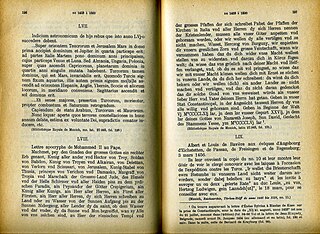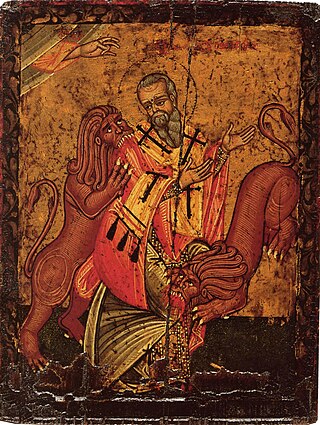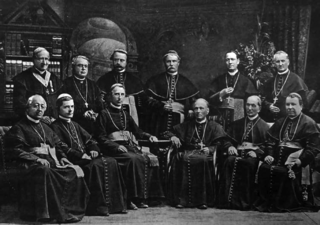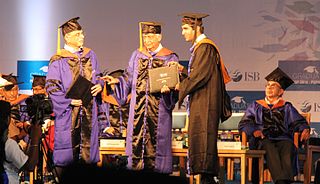Related Research Articles

Apocrypha are biblical or related writings not forming part of the accepted canon of scripture, some of which might be of doubtful authorship or authenticity. In Christianity, the word apocryphal (ἀπόκρυφος) was first applied to writings that were to be read privately rather than in the public context of church services. Apocrypha were edifying Christian works that were not always initially included as canonical scripture.
A bishop is an ordained member of the clergy who is entrusted with a position of authority and oversight in a religious institution. In Christianity, bishops are normally responsible for the governance and administration of dioceses. The role or office of the bishop is called episcopacy. Organizationally, several Christian denominations utilize ecclesiastical structures that call for the position of bishops, while other denominations have dispensed with this office, seeing it as a symbol of power. Bishops have also exercised political authority within their dioceses.

The word catholic comes from the Greek phrase καθόλου 'on the whole, according to the whole, in general', and is a combination of the Greek words κατά 'about' and ὅλος 'whole'. The first known use of "Catholic" was by the church father Saint Ignatius of Antioch in his Letter to the Smyrnaeans. In the context of Christian ecclesiology, it has a rich history and several usages.

The First Council of Nicaea was a council of Christian bishops convened in the Bithynian city of Nicaea by the Roman Emperor Constantine I. The Council of Nicaea met from May until the end of July 325.

A priest is a religious leader authorized to perform the sacred rituals of a religion, especially as a mediatory agent between humans and one or more deities. They also have the authority or power to administer religious rites; in particular, rites of sacrifice to, and propitiation of, a deity or deities. Their office or position is the "priesthood", a term which also may apply to such persons collectively. A priest may have the duty to hear confessions periodically, give marriage counseling, provide prenuptial counseling, give spiritual direction, teach catechism, or visit those confined indoors, such as the sick in hospitals and nursing homes.

A cathedral is a church that contains the cathedra of a bishop, thus serving as the central church of a diocese, conference, or episcopate. Churches with the function of "cathedral" are usually specific to those Christian denominations with an episcopal hierarchy, such as the Catholic, Eastern Orthodox, Anglican, and some Lutheran churches. Church buildings embodying the functions of a cathedral first appeared in Italy, Gaul, Spain, and North Africa in the 4th century, but cathedrals did not become universal within the Western Catholic Church until the 12th century, by which time they had developed architectural forms, institutional structures, and legal identities distinct from parish churches, monastic churches, and episcopal residences. The cathedral is more important in the hierarchy than the church because it is from the cathedral that the bishop governs the area under his or her administrative authority.

Clergy are formal leaders within established religions. Their roles and functions vary in different religious traditions, but usually involve presiding over specific rituals and teaching their religion's doctrines and practices. Some of the terms used for individual clergy are clergyman, clergywoman, clergyperson, churchman, cleric, ecclesiastic, and vicegerent while clerk in holy orders has a long history but is rarely used.

A deacon is a member of the diaconate, an office in Christian churches that is generally associated with service of some kind, but which varies among theological and denominational traditions.
The word anathema has two main meanings. One is to describe that something or someone is being hated or avoided. The other refers to a formal excommunication by a church. These meanings come from the New Testament, where an Anathema was a person or thing cursed or condemned by God. In the Old Testament, an Anathema was something or someone cursed and separated from God because of sin. These represent two types of settings, one for devotion, the other for destruction.

The Eastern Catholic Churches or Oriental Catholic Churches, also called the Eastern-Rite Catholic Churches, Eastern Rite Catholicism, or simply the Eastern Churches, are 23 Eastern Christian autonomous particular churches of the Catholic Church in full communion with the pope in Rome. Although they are distinct theologically, liturgically, and historically from the Latin Church, they are all in full communion with it and with each other. Eastern Catholics are a minority within the Catholic Church; of the 1.3 billion Catholics in communion with the pope, approximately 18 million are members of the eastern churches. The largest numbers of Eastern Catholics are found in Eastern Europe, Eastern Africa, the Middle East, and India. As of 2022, the Syro-Malabar Church is the largest Eastern Catholic Church, followed by the Ukrainian Greek Catholic Church.

Ordination is the process by which individuals are consecrated, that is, set apart and elevated from the laity class to the clergy, who are thus then authorized to perform various religious rites and ceremonies. The process and ceremonies of ordination vary by religion and denomination. One who is in preparation for, or who is undergoing the process of ordination is sometimes called an ordinand. The liturgy used at an ordination is commonly found in a book known as an Ordinal which provides the ordo for celebrations.
An ostiarius, a Latin word sometimes anglicized as ostiary but often literally translated as porter or doorman, originally was an enslaved person or guard posted at the entrance of a building, similarly to a gatekeeper.

A convocation is a group of people formally assembled for a special purpose, mostly ecclesiastical or academic. The Britanica dictionary defines it as "a large formal meeting of people ".

In Christianity, a minister is a person authorised by a church or other religious organization to perform functions such as teaching of beliefs; leading services such as weddings, baptisms or funerals; or otherwise providing spiritual guidance to the community. The term is taken from Latin minister. In some church traditions the term is usually used for people who have been ordained, but in other traditions it can also be used for non-ordained.

An archdeacon is a senior clergy position in the Church of the East, Chaldean Catholic Church, Syriac Orthodox Church, Anglican Communion, St Thomas Christians, Eastern Orthodox churches and some other Christian denominations, above that of most clergy and below a bishop. In the High Middle Ages it was the most senior diocesan position below a bishop in the Catholic Church. An archdeacon is often responsible for administration within an archdeaconry, which is the principal subdivision of the diocese. The Oxford Dictionary of the Christian Church has defined an archdeacon as "A cleric having a defined administrative authority delegated to him by the bishop in the whole or part of the diocese." The office has often been described metaphorically as oculus episcopi, the "bishop's eye".

In Anglicanism, a licensed lay minister (LLM) or lay reader is a person authorised by a bishop to lead certain services of worship, to preach and to carry out pastoral and teaching functions. They are formally trained and admitted to the office, but they remain part of the laity, not of the clergy.
In Christianity, the term secular clergy refers to deacons and priests who are not monastics or otherwise members of religious life. Secular priests are priests who commit themselves to a certain geographical area and are ordained into the service of the residents of a diocese or equivalent church administrative region. That includes serving the everyday needs of the people in parishes, but their activities are not limited to that of their parish.

The priesthood is the office of the ministers of religion, who have been commissioned ("ordained") with the Holy orders of the Catholic Church. Technically, bishops are a priestly order as well; however, in layman's terms priest refers only to presbyters and pastors. The church's doctrine also sometimes refers to all baptised (lay) members as the "common priesthood", which can be confused with the ministerial priesthood of the consecrated clergy.
In the Roman Catholic Church, the term minister is used with various meanings. Most commonly, the word refers to a person, either lay or ordained, who is commissioned to perform some act on behalf of the Catholic Church. It is not a particular office or rank of clergy, as is the case in some other Christian organisations; rather, minister may be used as a collective term for vocational or professional pastoral leaders including clergy and non-clergy. It is also used in reference to the canonical and liturgical administration of sacraments, as part of some offices, and with reference to the exercise of the lay apostolate.

In canon law, a canon designates some law promulgated by a synod, an ecumenical council, or an individual bishop.
References
- ↑ Smith, William; Cheetham, Samuel, eds. (1880). A Dictionary of Christian Antiquities. Vol. 2. Hartford: J. B. Burr. p. 1156 – via archive.org.
- ↑ Class of 2016 Matriculates at McKendree Retrieved 2012-August-25.
- ↑ Ceremonies Unit: Matriculation - Durham University
- ↑ Hawicks, Heike; Runde, Ingo (2024). Vennebusch, Jochen Hermann (ed.). University Matriculas as Material Testimonies of the Initiation Culture at Universities. A comparative study based on the example of the Heidelberg matriculation records. doi:10.25162/9783515136501. ISBN 978-3-515-13650-1 . Retrieved November 11, 2024.
{{cite book}}:|website=ignored (help)
 This article incorporates text from a publication now in the public domain : Herbermann, Charles, ed. (1913). "Matricula". Catholic Encyclopedia . New York: Robert Appleton Company.
This article incorporates text from a publication now in the public domain : Herbermann, Charles, ed. (1913). "Matricula". Catholic Encyclopedia . New York: Robert Appleton Company.